形容词定义
形容词基本用法
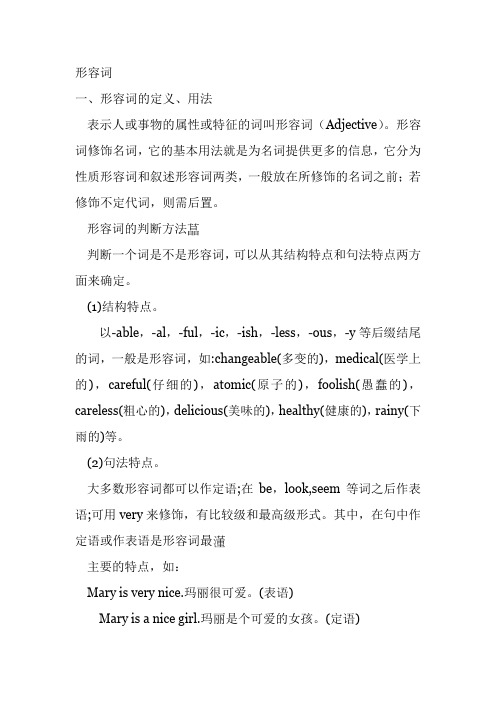
形容词一、形容词的定义、用法表示人或事物的属性或特征的词叫形容词(Adjective)。
形容词修饰名词,它的基本用法就是为名词提供更多的信息,它分为性质形容词和叙述形容词两类,一般放在所修饰的名词之前;若修饰不定代词,则需后置。
形容词的判断方法判断一个词是不是形容词,可以从其结构特点和句法特点两方面来确定。
(1)结构特点。
以-able,-al,-ful,-ic,-ish,-less,-ous,-y等后缀结尾的词,一般是形容词,如:changeable(多变的),medical(医学上的),careful(仔细的),atomic(原子的),foolish(愚蠢的),careless(粗心的),delicious(美味的),healthy(健康的),rainy(下雨的)等。
(2)句法特点。
大多数形容词都可以作定语;在be,look,seem等词之后作表语;可用very来修饰,有比较级和最高级形式。
其中,在句中作定语或作表语是形容词最主要的特点,如:Mary is very nice.玛丽很可爱。
(表语)Mary is a nice girl.玛丽是个可爱的女孩。
(定语)He was asleep.他睡着了。
(表语)She is a perfect teacher.她是位十全十美的老师。
(定语)形容词的用法1.形容词用作定语Li Mei is a beautiful city girl.李梅是一个漂亮的城市女孩。
The new student comes from Japan.那个新来的学生是日本人。
2.形容词用作表语My father’s car is very expensive.我父亲的小车很贵。
The English story is very interesting.那个英文故事很有趣。
3.形容词用作宾语补足语Don’t keep the door open. 别让门敞着。
His success made him happy.他的成功让他感到幸福。
初一英语形容词和副词语法知识总结(讲解+考点+综合练习):形容词和副词
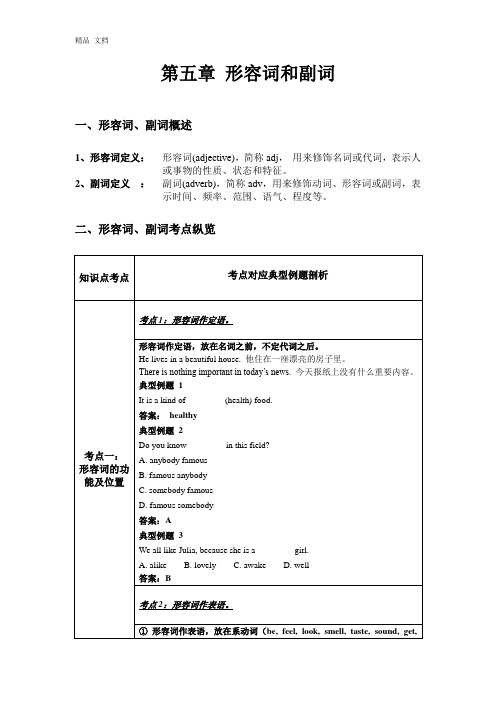
第五章形容词和副词一、形容词、副词概述1、形容词定义:形容词(adjective),简称adj,用来修饰名词或代词,表示人或事物的性质、状态和特征。
2、副词定义:副词(adverb),简称adv,用来修饰动词、形容词或副词,表示时间、频率、范围、语气、程度等。
二、形容词、副词考点纵览三、综合练习( )1. –If you don’t like the red coat, how about the green one?–OK, but do you have _______ size in green? This one is a bit small for me.A. a bigB. a biggerC. the bigD. the bigger( )2. –Mum, I think I’m _______ to get back to school.–Not really, my dear. You’d better stay at home for anoth er day or two.A. so wellB. so goodC. well enoughD. good enough ( )3. –What delicious cakes! –They will taste _______ with butter.A. goodB. betterC. badD. worse( )4. –Mr. Zhou , of all the students in our group, who lives _______ ?–I think Li Lei does.A. farB. fartherC. farthestD. the farther( )5. With a history of more than 1,400 years, ZhaoZhou Bridge is the _______ stone arch bridge in the world .A. oldB. olderC. oldestD. elder( )6. Bob never does him homework _______ Mary. He makes lots of mistakes.A. so careful asB. as carefully asC. carefully asD. as careful as ( )7. A: How can I speak English _______ you?B: You’d better speak more, I think.A. as good asB. more thanC. as well asD. as much as( )8. Your English is good. I’ll try my best to speak it as _______you do.A. clearly asB. clear asC. clearer thanD. more clearly ( )9. –Is your mother badly ill?–No, _______ , only a little cold.A. serious anythingB. serious nothingC. nothing seriousD. anything serious( )10. I’m not sure if I’m going to Tim’s party; I may go to the concert _______ .A. onlyB. insteadC. earlyD. late( )11. Although they are brothers, they are the _______ opposite of one another.A. veryB. justC. fewD. little( )12. The new Bright Restaurant is _______ than the old one. Moore and more people like to eat there.A. goodB. betterC. badD. worse( )13. Wang Ping does _______ in physics that I missed the first class.A. badlyB. Most badlyC. worseD. worst( )14. I got up so _______ this morning that I missed the first class.A. earlyB. lateC. quietlyD. neatly( )15. –Do you enjoy traveling by plane?–No. It’s _______ expensive.A. much moreB. more muchC. too muchD. much too( )16. I’m afraid the headmaster is _______ busy to meet the visitors.A. too muchB. much tooC. so muchD. much too( )17. How beautifully she sings! I’ve never heard _______ .A. the better voiceB. a good voiceC. the best voiceD. a better voice( )18. You do well in your lessons. I’m _______ you will pass the exam.A. sureB. afraidC. sadD. sorry( )19. –Who is _______ in your class?–Fred.A. tallB. tallerC. tallestD. the tallest( )20. –What do you think of the football match?–Wonderful! The Chinese football team has never played _______ .A. betterB. bestC. worseD. worst( )21. The population of China is _____ than _____ of any other country in the world.A. larger , the oneB. more , thatC. larger , thatD. more , the one ( )22. There is much wine here, but _______ people want to drink it.A. manyB. a littleC. fewD. a few( )23. People speak ______ of the film Not One Less. It is really necessary for every child to go to school.A. loudB. loudlyC. highD. highly( )24. She always finishes her homework on time. She ______ leaves it for tomorrow.A. alwaysB. neverC. usuallyD. sometimes( )25. The football match was _______, so the boys were _______ about it.A. excited , excitingB. exciting, excitedC. excited , excitedD. exciting , exciting( )26. Playing table tennis isn’t difficult. You can learn it _______.A. easyB. easilyC. quickD. hardly( )27. We Chinese always put our family name _______.A. lastB. nearlyC. firstD. in the middle ( )28. This kind of T-shirt look _______ and sells _______ in the market.A. nice, goodB. well , wellC. nice , wellD. good , nice( )29. The light in the room wasn’t _______ for me to read.A. brightly enoughB. enough brightlyC. enough brightD. bright enough( )30. –Look, this digital camera is really cheap! It’s only five hundred yuan.–The _______ , the better. I’m short _______ money, you know.A. cheaper , ofB. cheap, forC. expensive , ofD. more expensive , for( )31. Which subject do you like _______ , math, Chinese or English?A. betterB. bestC. wellD. very much( )32. _______ little water is not enough for _______ many people.A. Such , soB. So , soC. Such , suchD. So , such( )33. English is spoken by _______ people.A. a lotB. much manyC. a large number ofD. a great deal of ( )34. –Isn’t that Mary?–Yes, she always has a(an) _______ smile on her face.A. aloneB. kindlyC. ownD. friendly( )35. –Do you prefer music to drawing?–No. I like drawing _______.A. wellB. mostC. betterD. best( )36. Since China has been a member of the WTO, English is ______ useful than before.A. moreB. mostC. muchD. very( )37. Can you speak a little louder? I can _______ hear you.A. hardB. reallyC. hardlyD. clearly( )38. China has a _______ population and long history.A. manyB. largeC. muchD. big( )39. Do you have _______ to say?A. important anythingB. anything importantC. important somethingD. something important( )40. Which is _______ , English or Chinese?A. interestingB. interestingerC. more interestingD. most interesting( )41. –The TV programme is boring. Shall we play chess intead?–All right. That is _______ than watching a boring programme.A. very goodB. much goodC. very betterD. much better( )42. –Mum, could you buy me a dress like this?–Certainly, we can buy _______ one than this, but _______ this.A. a better, better thanB. a worse , as good asC. a cheaper , as good asD. a more important , not as good as ( )43. Let’s enjoy the song Yesterday Once More. It sounds _______.A. wellB. sadlyC. niceD. bad( )44. –Is the physics problem _______ ?–Yes. I can work it out _______.A. easy , easilyB. easy, easyC. easily , easyD. easily , easily ( )45. Hainan is a very large island. It’s the second _______ island in China.A. largeB. largerC. largerD. most large( )46. What a _______ cough! You seem _______ ill.A. terrible, terriblyB. terribly , terribleC. terrible , terribleD. terribly , terribly ( )47. I’m not sure whether Mary can sing _______ Mabel.A. as well asB. as good asC. so good asD. as better as( )48. Chinese is _______ more difficult than English.A. mostB. veryC. manyD. much( )49. The _______ old man told his son to be a good boy.A. diedB. deadC. dyingD. death( )50. Today my sister is feeling _______ to go to the factory.A. enough goodB. good enoughC. well enoughD. enough well参考答案精品文档1—5 B C B C C6—10 B C A C B11—15 A B D B D16—20 B D A D A21—25 C C D B B26—30 B C C D A31—35 B B C D C36—40 A C B B C文档说明(Word文档可以删除编辑)专注于精品文档:中考、高考、数学语文英语试卷、高中复习题目、小学试卷教案合同协议施工组织设计、期中、期末等测试,本文档目的是为了节省读者的工作时间,提高读者的工作效率,读者可以放心下载文档进行编辑使用.文档来源网络改编,审核有可能疏忽,如果有错误或侵权,请联系本店马上删除。
形容词原级、比较级、最高级的用法
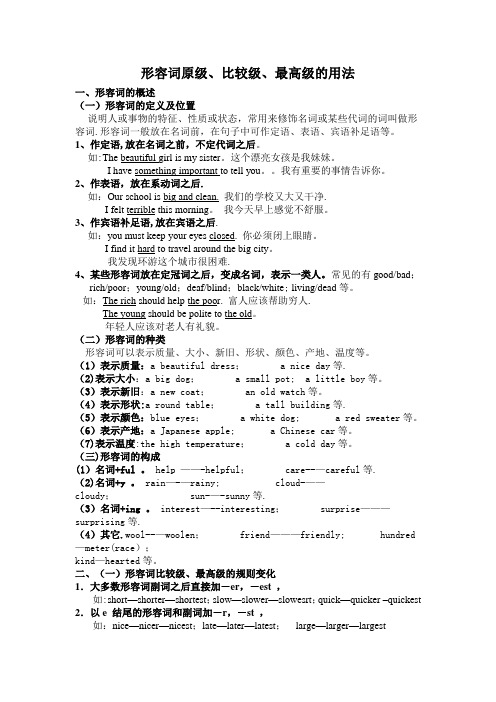
形容词原级、比较级、最高级的用法一、形容词的概述(一)形容词的定义及位置说明人或事物的特征、性质或状态,常用来修饰名词或某些代词的词叫做形容词.形容词一般放在名词前,在句子中可作定语、表语、宾语补足语等。
1、作定语,放在名词之前,不定代词之后。
如:The beautiful girl is my sister。
这个漂亮女孩是我妹妹。
I have something important to tell you。
我有重要的事情告诉你。
2、作表语,放在系动词之后.如:Our school is big and clean. 我们的学校又大又干净.I felt terrible this morning。
我今天早上感觉不舒服。
3、作宾语补足语,放在宾语之后.如:you must keep your eyes closed. 你必须闭上眼睛。
I find it hard to travel around the big city。
我发现环游这个城市很困难.4、某些形容词放在定冠词之后,变成名词,表示一类人。
常见的有good/bad;rich/poor;young/old;deaf/blind;black/white; living/dead等。
如:The rich should help the poor. 富人应该帮助穷人.The young should be polite to the old。
年轻人应该对老人有礼貌。
(二)形容词的种类形容词可以表示质量、大小、新旧、形状、颜色、产地、温度等。
(1)表示质量:a beautiful dress; a nice day等.(2)表示大小:a big dog; a small pot; a little boy等。
(3)表示新旧:a new coat; an old watch等。
(4)表示形状:a round table; a tall building等.(5)表示颜色:blue eyes; a white dog; a red sweater等。
形容词的定义
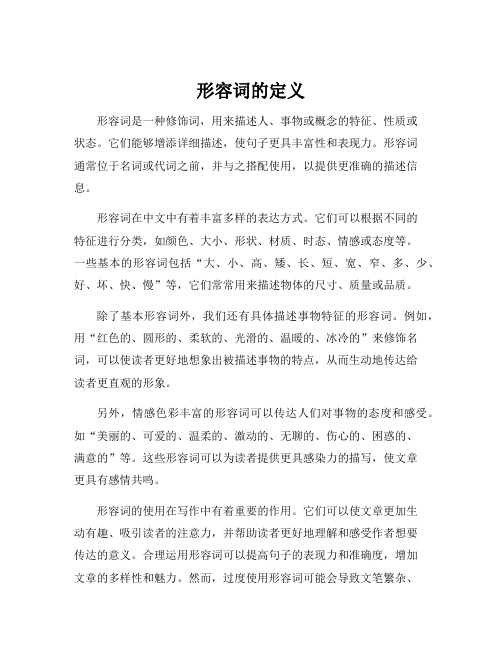
形容词的定义形容词是一种修饰词,用来描述人、事物或概念的特征、性质或状态。
它们能够增添详细描述,使句子更具丰富性和表现力。
形容词通常位于名词或代词之前,并与之搭配使用,以提供更准确的描述信息。
形容词在中文中有着丰富多样的表达方式。
它们可以根据不同的特征进行分类,如颜色、大小、形状、材质、时态、情感或态度等。
一些基本的形容词包括“大、小、高、矮、长、短、宽、窄、多、少、好、坏、快、慢”等,它们常常用来描述物体的尺寸、质量或品质。
除了基本形容词外,我们还有具体描述事物特征的形容词。
例如,用“红色的、圆形的、柔软的、光滑的、温暖的、冰冷的”来修饰名词,可以使读者更好地想象出被描述事物的特点,从而生动地传达给读者更直观的形象。
另外,情感色彩丰富的形容词可以传达人们对事物的态度和感受。
如“美丽的、可爱的、温柔的、激动的、无聊的、伤心的、困惑的、满意的”等。
这些形容词可以为读者提供更具感染力的描写,使文章更具有感情共鸣。
形容词的使用在写作中有着重要的作用。
它们可以使文章更加生动有趣、吸引读者的注意力,并帮助读者更好地理解和感受作者想要传达的意义。
合理运用形容词可以提高句子的表现力和准确度,增加文章的多样性和魅力。
然而,过度使用形容词可能会导致文笔繁杂、冗长,影响文章的清晰度和流畅性。
因此,在使用形容词时应当注意适度和合理运用,避免形容词过多或重复。
总而言之,形容词是一种在写作中非常重要的修饰词。
它们通过丰富多样的表达方式,给予事物更精准的描述,使文章更富有表现力和感染力。
合理运用形容词可以让读者更好地理解作者的意图,并为读者呈现出一个更立体、更生动的世界。
因此,在写作中,我们应该善于运用形容词,并充分发挥其描写和修饰的作用。
英语形容词辨认:识别形容词

英语形容词辨认:识别形容词形容词是英语语法中的重要组成部分,它用来修饰名词或代词,描述人、事、物的性质、特征、状态等。
在日常生活和学习中,准确识别形容词对于提高英语水平至关重要。
本文将介绍如何准确辨认和识别英语中的形容词。
一、形容词的定义和作用形容词是一种词性,描述和限定名词或代词所指的人或事物的性质、特征、状态等。
形容词可以放在名词前面或后面,用来修饰名词,使其更具体、生动和形象。
形容词可以增添句子的语义,让句子更加丰富多彩。
二、形容词的特点和识别方法1. 形容词的特点形容词通常具备以下几个特点:a) 形容词可以在句子中独立存在,形成形容词短语。
例如:The weather is beautiful today.(今天的天气很美丽。
)b) 形容词具有比较级和最高级形式。
例如:The weather is hotter than yesterday.(今天的天气比昨天热。
)2. 形容词的识别方法在句子中,判断一个词是否为形容词可以从以下几个方面入手:a) 形容词通常位于名词前面,修饰名词。
例如:a beautiful flower(一个美丽的花朵)b) 形容词通常位于系动词(be动词)后面,用来描述被系动词修饰的名词。
例如:The flower is beautiful.(这朵花很美丽。
)c) 形容词可以在句子中被副词修饰或者被程度副词修饰。
例如:very beautiful(非常美丽)三、常见形容词及其用法除了了解形容词的特点和识别方法外,在学习英语的过程中,还需要掌握常见的形容词及其用法。
以下是一些常见形容词及其用法的例子:1. 形容外貌的形容词beautiful(美丽的)、handsome(英俊的)、attractive(有吸引力的)、ugly(丑陋的)例句:She is a beautiful girl.(她是一个漂亮的女孩。
)He is a handsome man.(他是一个英俊的男人。
形容词是什么
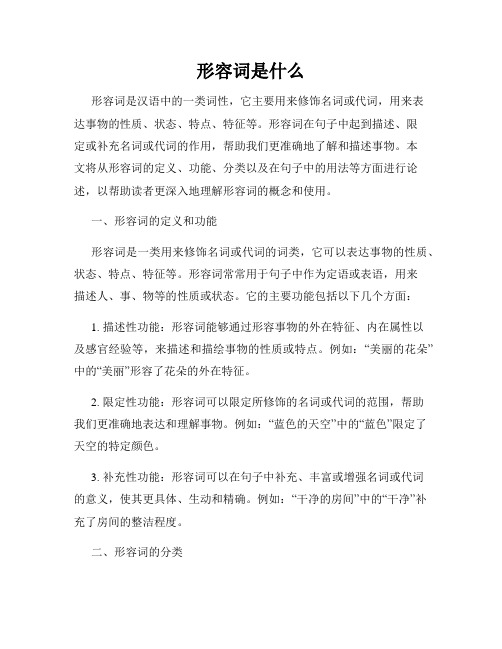
形容词是什么形容词是汉语中的一类词性,它主要用来修饰名词或代词,用来表达事物的性质、状态、特点、特征等。
形容词在句子中起到描述、限定或补充名词或代词的作用,帮助我们更准确地了解和描述事物。
本文将从形容词的定义、功能、分类以及在句子中的用法等方面进行论述,以帮助读者更深入地理解形容词的概念和使用。
一、形容词的定义和功能形容词是一类用来修饰名词或代词的词类,它可以表达事物的性质、状态、特点、特征等。
形容词常常用于句子中作为定语或表语,用来描述人、事、物等的性质或状态。
它的主要功能包括以下几个方面:1. 描述性功能:形容词能够通过形容事物的外在特征、内在属性以及感官经验等,来描述和描绘事物的性质或特点。
例如:“美丽的花朵”中的“美丽”形容了花朵的外在特征。
2. 限定性功能:形容词可以限定所修饰的名词或代词的范围,帮助我们更准确地表达和理解事物。
例如:“蓝色的天空”中的“蓝色”限定了天空的特定颜色。
3. 补充性功能:形容词可以在句子中补充、丰富或增强名词或代词的意义,使其更具体、生动和精确。
例如:“干净的房间”中的“干净”补充了房间的整洁程度。
二、形容词的分类形容词可以按照不同的分类标准进行分类。
一般来说,形容词可以分为以下几类:1. 基本形容词:基本形容词是最常见和最常用的形容词,它们常常直接描述事物的性质和特征,如“美丽的”、“快乐的”、“高大的”等。
2. 比较级形容词:比较级形容词用于表示两者之间的比较,它们一般以“更...”或“比...更...”的形式出现,如“更美丽的”、“比较高的”、“不那么快乐的”等。
3. 最高级形容词:最高级形容词用于表示三者或三者以上之间的比较,它们一般以“最...”的形式出现,如“最美丽的”、“最高的”、“最幸福的”等。
4. 构词形容词:构词形容词是通过添加前缀或后缀来构成的形容词,它们可以改变原词的含义或补充形容词的特点,如“忧郁的”、“相似的”、“无聊的”等。
5. 形容词性的量词:形容词性的量词是一种特殊的形容词,它们表示事物的数量或程度,如“很多的”、“少量的”、“非常重要的”等。
英语基础语法_形容词的定义、用法
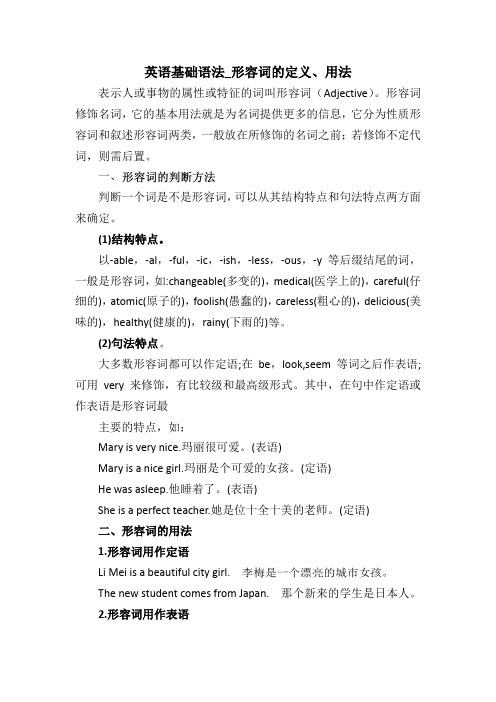
英语基础语法_形容词的定义、用法表示人或事物的属性或特征的词叫形容词(Adjective)。
形容词修饰名词,它的基本用法就是为名词提供更多的信息,它分为性质形容词和叙述形容词两类,一般放在所修饰的名词之前;若修饰不定代一、判断一个词是不是形容词,可以从其结构特点和句法特点两方面(1)结构特点。
以-able,-al,-ful,-ic,-ish,-less,-ous,-y等后缀结尾的词,一般是形容词,如:changeable(多变的),medical(医学上的),careful(仔细的),atomic(原子的),foolish(愚蠢的),careless(粗心的),delicious(美味的),healthy(健康的),rainy(下雨的)(2)句法特点大多数形容词都可以作定语;在be,look,seem等词之后作表语;可用very来修饰,有比较级和最高级形式。
其中,在句中作定语或作表语是形容词最Mary is very nice.玛丽很可爱。
(表语)Mary is a nice girl.玛丽是个可爱的女孩。
(定语)He was asleep.他睡着了。
(表语)She is a perfect teacher.她是位十全十美的老师。
(定语)二、形容词的用法1.形容词用作定语Li Mei is a beautiful city girl.The new student comes from Japan.2.形容词用作表语My father’s car is very expensive.The English story is very interesting.3.形容词用作宾语补足语Don’t keep the door open.His success made him happy.We finally found the dictionaries very useful.4.“the+形容词”用作主语及宾语The old often think of old things.The new always take the place of the old.5.形容词有时也可用作状语或补语Please speak loud and clear.These soldiers spent three days in the cold weather,cold and hungry.士兵们又冷又饿在严寒的气候中After seven days, the children came back from the forest safe.6.少数形容词只能作表语这些形容词包括ill,asleep,awake,alone,well,worth,glad,unable,afraid(正)Don’t be afraid.(误)Mr Li is an afraid man.(正)The old man was ill yesterday.(误)This is an ill person.(正)This place is worth visiting.(误)That is a worth book.7.这些形容词包括little,live(活着的),elder,eldest 等,只能作定语,不能作表语。
英语形容词的功用
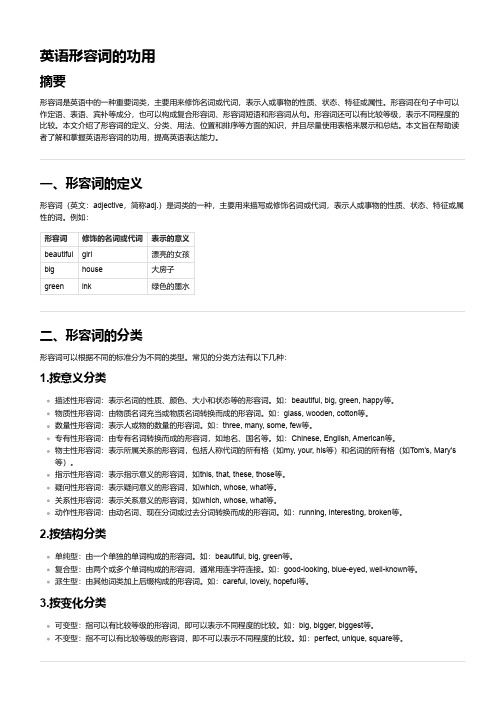
英语形容词的功用摘要形容词是英语中的一种重要词类,主要用来修饰名词或代词,表示人或事物的性质、状态、特征或属性。
形容词在句子中可以作定语、表语、宾补等成分,也可以构成复合形容词、形容词短语和形容词从句。
形容词还可以有比较等级,表示不同程度的比较。
本文介绍了形容词的定义、分类、用法、位置和排序等方面的知识,并且尽量使用表格来展示和总结。
本文旨在帮助读者了解和掌握英语形容词的功用,提高英语表达能力。
一、形容词的定义形容词(英文:adjective,简称adj.)是词类的一种,主要用来描写或修饰名词或代词,表示人或事物的性质、状态、特征或属性的词。
例如:形容词修饰的名词或代词表示的意义beautiful girl漂亮的女孩big house大房子green ink绿色的墨水二、形容词的分类形容词可以根据不同的标准分为不同的类型。
常见的分类方法有以下几种:1.按意义分类描述性形容词:表示名词的性质、颜色、大小和状态等的形容词。
如:beautiful, big, green, happy等。
物质性形容词:由物质名词充当或物质名词转换而成的形容词。
如:glass, wooden, cotton等。
数量性形容词:表示人或物的数量的形容词。
如:three, many, some, few等。
专有性形容词:由专有名词转换而成的形容词,如地名、国名等。
如:Chinese, English, American等。
物主性形容词:表示所属关系的形容词,包括人称代词的所有格(如my, your, his等)和名词的所有格(如Tom's, Mary's 等)。
指示性形容词:表示指示意义的形容词,如this, that, these, those等。
疑问性形容词:表示疑问意义的形容词,如which, whose, what等。
关系性形容词:表示关系意义的形容词,如which, whose, what等。
动作性形容词:由动名词、现在分词或过去分词转换而成的形容词。
形容词讲解大全 (1)

形容词讲解大全一、形容的定义二、形容的形成三、形容词的用法和种类1.等级形容词和非等级形容词2.描绘性形容词和限制性形容词3.静态形容词和动态形容词4.主动形容词和被动形容词5.定语形容词和表语形容词6.简单形容词和复合形容词四、形容的位置1.前置和后置2.多个形容词的运用顺序一、形容的定义表示人或事物的属性,特征或状态的词叫形容词(Adjective).形容词修饰名词,它的基本用法就是为名词提供更多的信息,它分为性质形容词和叙述形容词两类.一般放在所修饰的名词之前;若修饰不定代词,则需后置. 形容词在句中可用作表语、定语、补语等形容词的判断方法二、形容词的构成判断一个词是不是形容词,可以从其结构特点和句法特点两方面来确定.(1)结构特点以-able,-al,-ful, -ic,-ish,-less,-ous,-y等后缀结尾的词,一般是形容词,如:changeable(多变的),medical(医学上的),careful(仔细的),atomic(原子的),foolish(愚蠢的),careless(粗心的),delicious(美味的),healthy(健康的),rainy(多雨的)等.(2)句法特点大多数形容词都可以作定语;在be,look,seem等词之后作表语;可用very来修饰,有比较级和最高级形式.其中,在句中作定语或作表语是形容词最主要的特点.如: Mary is very nice.玛丽很可爱.(表语)Mary is a nice girl.玛丽是个可爱的女孩.(定语) He was asleep.他睡着了.(表语)She is a perfect teacher.她是位十全十美的老师.(定语)构成11. 形容词就其词形来说分为简单形容词和复合形容词。
简单形容词是由一个字构成的。
2. 单个字形成的形容词,如:red (红色的) big (大的) good (好的) square (方形的)3. 一些名词加字尾后可以形成形容词。
形容词的基本概念及用法
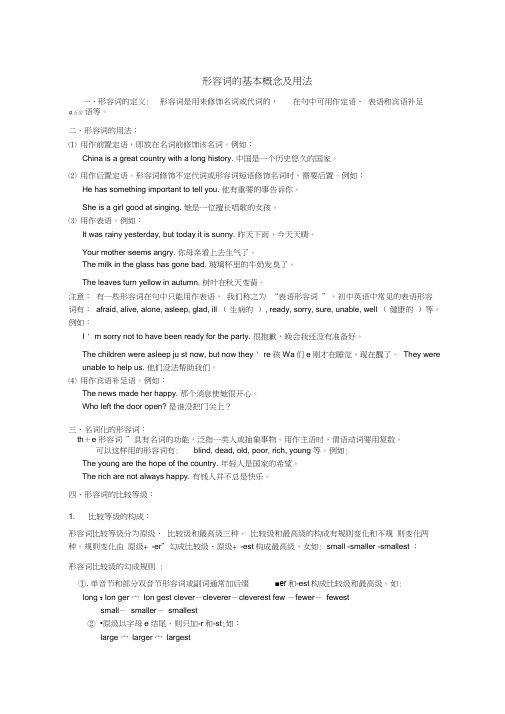
形容词的基本概念及用法一、形容词的定义:形容词是用来修饰名词或代词的,在句中可用作定语、表语和宾语补足q五坐语等。
二、形容词的用法:⑴ 用作前置定语,即放在名词前修饰该名词。
例如:China is a great country with a long history. 中国是一个历史悠久的国家。
⑵ 用作后置定语。
形容词修饰不定代词或形容词短语修饰名词时,需要后置。
例如:He has something important to tell you. 他有重要的事告诉你。
She is a girl good at singing. 她是一位擅长唱歌的女孩。
⑶ 用作表语。
例如:It was rainy yesterday, but today it is sunny. 昨天下雨,今天天晴。
Your mother seems angry. 你母亲看上去生气了。
The milk in the glass has gone bad. 玻璃杯里的牛奶发臭了。
The leaves turn yellow in autumn. 树叶在秋天变黄。
注意:有一些形容词在句中只能用作表语,我们称之为“表语形容词”。
初中英语中常见的表语形容词有:afraid, alive, alone, asleep, glad, ill (生病的), ready, sorry, sure, unable, well (健康的)等。
例如:I ' m sorry not to have been ready for the party. 很抱歉,晚会我还没有准备好。
The children were asleep ju st now, but now they ' re 孩Wa们e刚才在睡觉,现在醒了。
They were unable to help us. 他们没法帮助我们。
⑷ 用作宾语补足语。
例如:The news made her happy. 那个消息使她很开心。
形容词知识点归纳
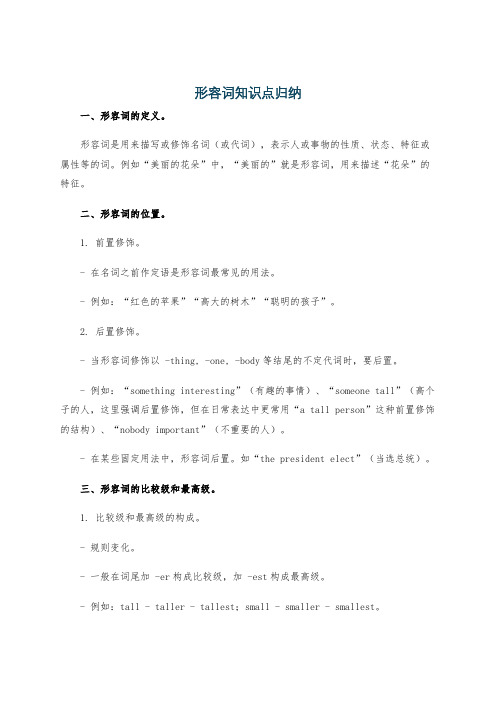
形容词知识点归纳一、形容词的定义。
形容词是用来描写或修饰名词(或代词),表示人或事物的性质、状态、特征或属性等的词。
例如“美丽的花朵”中,“美丽的”就是形容词,用来描述“花朵”的特征。
二、形容词的位置。
1. 前置修饰。
- 在名词之前作定语是形容词最常见的用法。
- 例如:“红色的苹果”“高大的树木”“聪明的孩子”。
2. 后置修饰。
- 当形容词修饰以 -thing, -one, -body等结尾的不定代词时,要后置。
- 例如:“something interesting”(有趣的事情)、“someone tall”(高个子的人,这里强调后置修饰,但在日常表达中更常用“a tall person”这种前置修饰的结构)、“nobody important”(不重要的人)。
- 在某些固定用法中,形容词后置。
如“the president elect”(当选总统)。
三、形容词的比较级和最高级。
1. 比较级和最高级的构成。
- 规则变化。
- 一般在词尾加 -er构成比较级,加 -est构成最高级。
- 例如:tall - taller - tallest;small - smaller - smallest。
- 以不发音的e结尾的形容词,加 -r构成比较级,加 -st构成最高级。
- 例如:nice - nicer - nicest;large - larger - largest。
- 以重读闭音节结尾,且末尾只有一个辅音字母的形容词,双写这个辅音字母,再加 -er或 -est。
- 例如:big - bigger - biggest;hot - hotter - hottest。
- 以“辅音字母 + y”结尾的形容词,把y变为i,再加 -er或 -est。
- 例如:happy - happier - happiest;heavy - heavier - heaviest。
- 不规则变化。
- 一些常见的不规则变化的形容词,如:good/well - better - best;bad/ill - worse - worst;many/much - more - most;little - less - least;far - farther/further - farthest/furthest(farther表示距离更远,further表示程度上更进一步等抽象概念)。
语文形容词与副词的用法
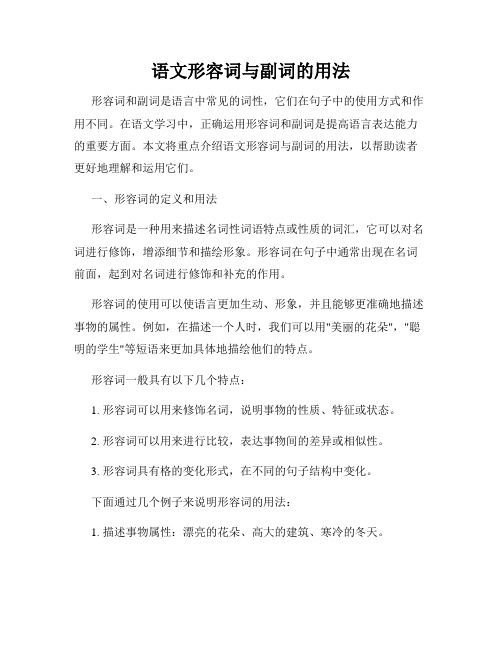
语文形容词与副词的用法形容词和副词是语言中常见的词性,它们在句子中的使用方式和作用不同。
在语文学习中,正确运用形容词和副词是提高语言表达能力的重要方面。
本文将重点介绍语文形容词与副词的用法,以帮助读者更好地理解和运用它们。
一、形容词的定义和用法形容词是一种用来描述名词性词语特点或性质的词汇,它可以对名词进行修饰,增添细节和描绘形象。
形容词在句子中通常出现在名词前面,起到对名词进行修饰和补充的作用。
形容词的使用可以使语言更加生动、形象,并且能够更准确地描述事物的属性。
例如,在描述一个人时,我们可以用"美丽的花朵","聪明的学生"等短语来更加具体地描绘他们的特点。
形容词一般具有以下几个特点:1. 形容词可以用来修饰名词,说明事物的性质、特征或状态。
2. 形容词可以用来进行比较,表达事物间的差异或相似性。
3. 形容词具有格的变化形式,在不同的句子结构中变化。
下面通过几个例子来说明形容词的用法:1. 描述事物属性:漂亮的花朵、高大的建筑、寒冷的冬天。
2. 比较级和最高级:比较级通常用于对两个事物进行比较,如"这本书比那本书更有趣";最高级则用于对三个或以上的事物进行比较,如"这是我见过的最好的作品"。
3. 形容词的变化:形容词在句子中具有格的变化,如"小明是个聪明的孩子","我们正在电影院看一部有趣的电影"。
二、副词的定义和用法副词是一种用来表示动作或状态的方式、程度、时间、地点、频率等的词汇,它通常用来修饰动词、形容词、副词和整个句子。
副词可以使句子更加具体明确,以及更加流畅自然。
副词的使用方式可以丰富语言表达,加强句子的修辞效果。
副词具有以下几个特点:1. 副词可以修饰动词、形容词、副词,使句子更加生动。
2. 副词可以表示时间、地点、方式、原因等等,增加句子的丰富程度。
3. 副词通常用来修饰整个句子,使句子的意思更加明确。
形容词和副词的区别及使用方法

形容词和副词的区别及使用方法形容词和副词是英语中两个重要的词类,它们在句子中起着形容和修饰词语的作用。
尽管它们有时在形式上相似,但它们在用法和功能上存在着一些区别。
本文将重点介绍形容词和副词的区别以及它们的使用方法。
一、形容词的定义和用法:形容词是一类用来修饰名词或代词的词类,用来描述事物的性质、状态、特征等。
形容词通常位于名词之前,它们可以帮助我们更准确地描绘和理解所描述的事物。
例如:1. 一个美丽的花园 (描述名词"花园"的特征)2. 一只小狗 (描述名词"狗"的大小)形容词可以有不同的级别,可以用于比较和最高级的形式来描述事物之间的差异。
比较级用来比较两个事物的差异,最高级用来比较三个或三个以上事物之间的差异。
例如:1. 这本书比那本书更有趣。
(比较级)2. 这是我读过的最好的书。
(最高级)二、副词的定义和用法:副词是一类用于修饰动词、形容词、其他副词或整个句子的词类,用来描述动作的方式、程度、时间、地点等。
副词可以提供更多的信息,使句子更加生动和具体。
例如:1. 他慢慢地走进了房间。
(描述动词"走"的方式)2. 我非常高兴见到你。
(描述形容词"高兴"的程度)副词可以通过在词根后面添加-ly来构成,但也有一些副词是不规则的,它们没有-ly的形式。
三、形容词和副词的区别:形容词和副词在用法和功能上有以下区别:1. 位置: 形容词通常位于名词之前,而副词通常位于动词、形容词或其他副词之前。
2. 修饰对象: 形容词主要用于修饰名词或代词,而副词用于修饰动词、形容词或其他副词。
3. 描述内容: 形容词描述名词的性质、状态或特征,而副词描述动词的方式、程度、时间或地点。
4. 变形形式: 形容词可以有比较级和最高级的变形形式,而副词只有比较级的形式。
四、形容词和副词的使用方法:1. 选择合适的形容词:a. 形容词通常用来描述人、事物的外观、特征等,要选择能准确表达所描述事物的特征的形容词。
中考英语专题讲练: 形容词、副词的概念及用法(含解析)
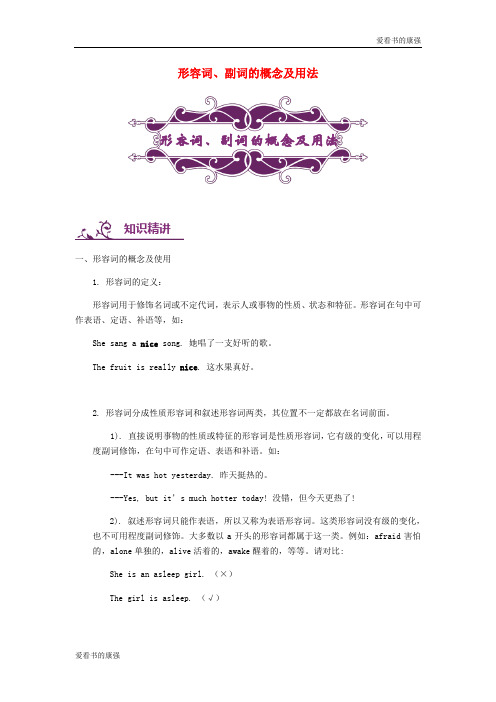
形容词、副词的概念及用法形容词、副词的概念及用法知识精讲一、形容词的概念及使用1. 形容词的定义:形容词用于修饰名词或不定代词,表示人或事物的性质、状态和特征。
形容词在句中可作表语、定语、补语等,如:She sang a nice song. 她唱了一支好听的歌。
The fruit is really nice. 这水果真好。
2. 形容词分成性质形容词和叙述形容词两类,其位置不一定都放在名词前面。
1). 直接说明事物的性质或特征的形容词是性质形容词,它有级的变化,可以用程度副词修饰,在句中可作定语、表语和补语。
如:---It was hot yesterday. 昨天挺热的。
---Yes, but it’s much hotter today! 没错,但今天更热了!2). 叙述形容词只能作表语,所以又称为表语形容词。
这类形容词没有级的变化,也不可用程度副词修饰。
大多数以a开头的形容词都属于这一类。
例如:afraid害怕的,alone单独的,alive活着的,awake醒着的,等等。
请对比:She is an asleep girl. (×)The girl is asleep. (√)3. 形容词在修饰someone, somebody, something, anyone, anybody, anything, nobody, nothing等不定代词时,需要置于其后。
如:Let me tell you something interesting.让我告诉你一些有趣的事吧。
4. 以-ly结尾的形容词1). 大部分形容词加-ly可构成副词。
但 friendly(有好的), deadly(致命的),lovely(可爱的), lonely(孤独的), likely(可能的), lively(充满活力的), ugly (丑陋的), brotherly (情同手足的)仍为形容词。
2). 有些以-ly 结尾既为形容词,也为副词。
形容词用法
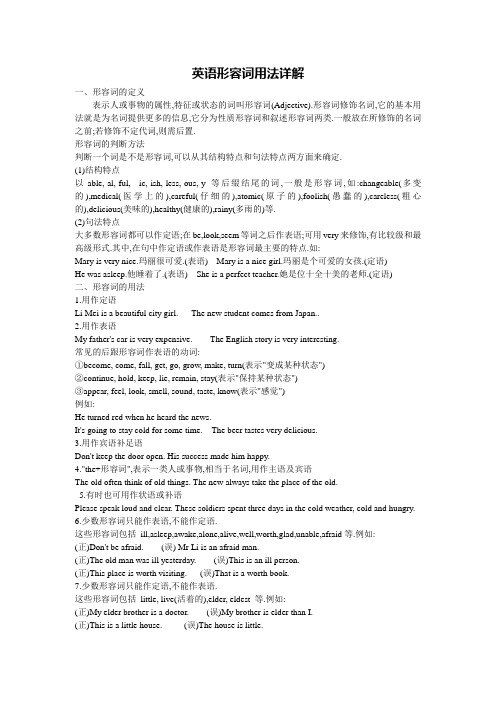
英语形容词用法详解一、形容词的定义表示人或事物的属性,特征或状态的词叫形容词(Adjective).形容词修饰名词,它的基本用法就是为名词提供更多的信息,它分为性质形容词和叙述形容词两类.一般放在所修饰的名词之前;若修饰不定代词,则需后置.形容词的判断方法判断一个词是不是形容词,可以从其结构特点和句法特点两方面来确定.(1)结构特点以-able,-al,-ful, -ic,-ish,-less,-ous,-y等后缀结尾的词,一般是形容词,如:changeable(多变的),medical(医学上的),careful(仔细的),atomic(原子的),foolish(愚蠢的),careless(粗心的),delicious(美味的),healthy(健康的),rainy(多雨的)等.(2)句法特点大多数形容词都可以作定语;在be,look,seem等词之后作表语;可用very来修饰,有比较级和最高级形式.其中,在句中作定语或作表语是形容词最主要的特点.如:Mary is very nice.玛丽很可爱.(表语) Mary is a nice girl.玛丽是个可爱的女孩.(定语)He was asleep.他睡着了.(表语) She is a perfect teacher.她是位十全十美的老师.(定语)二、形容词的用法1.用作定语Li Mei is a beautiful city girl. The new student comes from Japan..2.用作表语My father's car is very expensive. The English story is very interesting.常见的后跟形容词作表语的动词:①become, come, fall, get, go, grow, make, turn(表示"变成某种状态")②continue, hold, keep, lie, remain, stay(表示"保持某种状态")③appear, feel, look, smell, sound, taste, know(表示"感觉")例如:He turned red when he heard the news.It's going to stay cold for some time. The beer tastes very delicious.3.用作宾语补足语Don't keep the door open. His success made him happy.4."the+形容词",表示一类人或事物,相当于名词,用作主语及宾语The old often think of old things. The new always take the place of the old.5.有时也可用作状语或补语Please speak loud and clear. These soldiers spent three days in the cold weather, cold and hungry.6.少数形容词只能作表语,不能作定语.这些形容词包括ill,asleep,awake,alone,alive,well,worth,glad,unable,afraid等.例如:(正)Don't be afraid. (误) Mr Li is an afraid man.(正)The old man was ill yesterday. (误)This is an ill person.(正)This place is worth visiting. (误)That is a worth book.7.少数形容词只能作定语,不能作表语.这些形容词包括little, live(活着的),elder, eldest 等.例如:(正)My elder brother is a doctor. (误)My brother is elder than I.(正)This is a little house. (误)The house is little.(正)Do you want live fish or dead one (误)The old monkey is still live.三、形容词的位置1.形容词一般放在名词前作定语单个形容词修饰名词时,一般要放在名词的前面.它们的前面常常带有冠词,形容词性物主代词,指示代词,数词等.例如:a red flower一朵红花this interesting story这个有趣的故事six blind men 六个盲人my own house我自己的房子(1)当形容词所修饰的词是由some, any, every, no等构成的不定代词时,形容词必须置于所修饰的词之后.例如:She has something new to tell me. I have nothing important to do today.Do you know anybody else here? 这儿你还有认识的人吗(2)形容词后面有介词短语或不定式短语时,形容词必须置于名词之后.例如:It is a problem difficult to work out. Edison is a student difficult to teach.This is a kind of flowers easy to grow. 这是一种易栽的花.(3)在以下特殊用法中,形容词置于所修饰的名词之后.例如:All people, young or old, should be strict with themselves.We are building a new school, modern and super.All countries, rich and poor, should help one another. 所有的国家,无论穷富,都应该互相帮助.(4)有少数形容词,如enough和possible,既可置于所修饰的名词之前,也可置于所修饰的名词之后.例如:Do you have enough time(time enough)to prepare 你有足够的时间做准备吗Maybe it will be a possible chance(chance possible)for you.或许它将成为你的一次可能的机遇.(5)有些形容词,置于名词之前与之后,含义不尽相同.例如:the writer present 出席的作家the present writer 当代的作家2.两个以上的形容词修饰同一个名词时的排列顺序限定词→一般描绘性形容词→表示大小,长短,高低的形容词→表示形状的形容词→表示年龄,新旧的形容词→表示色彩的形容词→表示国籍,地区,出处的形容词→表示物质,材料的形容词→表示用途,类别的形容词→名词中心词.例如:an exciting international football match一场令人激动的国际足球赛a new red sports shirt一件新的红色运动衫a light black plastic umbrella一把轻的黑塑料伞a small old brown wooden house 一座小的旧的棕色的木头房子巧记形容词的排列顺序不少学生对如何排列形容词的顺序颇感困惑.在此,我们向同学们介绍一个简单的记忆方法.即请你记住"限观形龄色国材"这几个字,这似乎有点不大好记,那就请你记住"县官行令谢国材"吧.其含义分别是:"县"(限)代表限定词,包括冠词,指示代词,形容词性物主代词,名词所有格,数词等. "官"(观)代表表示观点的描绘性形容词,如:fine,beautiful,interesting等."行"(形)代表表示大小,长短,高低及形状的形容词,如:small,tall,high,little,round等. "令"(龄)代表表示年龄,新旧的形容词,如:old,young等."谢"("色"的近似音)代表表示颜色的形容词,如:white,black,yellow等."国"代表表示国籍,地区,出处的形容词(名词),如:English,American,mountain等."材"则代表形成中心名词的材料的形容词,如:stone,wooden,silk,plastic等.多个形容词同时修饰一个名词时,就按上述顺序排列,然后加上中心名词.例如:1.a fine old stone bridge一座古老漂亮的石桥2.two big round new Chinese wooden tables 两张新的中国式的木制大圆桌3.his large new black foreign car 他那辆新的大型黑色外国轿车形容词练习题1)Tony is going camping with ___ boys.A.little two otherB. two little otherC.two other littleD.little other two2)One day they crossed the ____bridge behind the palace.A. old Chinese stoneB. Chinese old stoneC. old stone ChineseD. Chinese stone old3)---- How was your recent visit to Qingdao?---- It was great. We visited some friends,and spent the ___days at the seaside.A. few last sunnyB. last few sunnyC. last sunny fewD. few sunny last4)-- Are you feeling ____?---- Yes,I'm fine now.A. any wellB. any betterC. quite goodD. quite better5)The experiment was____ easier than we had expected.A.moreB.much moreC.muchD.more much6)If there were no examinations, we should have ___ at school.A. the happiest timeB. a more happier timeC. much happiest timeD. a much happier time7)The weather in China is different from____.A. in AmericaB. one in AmericaC. AmericaD. that in America8)After the new technique was introduced,the factory produced ___ tractors in 1988 as the year before.A. as twice manyB. as many twiceC. twice as manyD. twice many as9)John has three sisters, Mary is the ____ of the three.A. most cleverestB. more cleverC. cleverestD. cleverer10). She told us ____ story that we all forget about the time.A. such an interestingB. such interesting aC. so an interestingD. a so interesting11) The story sounds____.A. to be trueB. as trueC. being trueD. true12) The pianos in the other shop will be ____, but____.A. cheaper, not as betterB. more cheap, not as betterC. cheaper, not as goodD. more cheap, not as good13).----How did you find your visit to the museum? ----I thoroughly enjoyed it. It was ____ than I expected.A. far more interestingB. even much interestingC. so more interestingD. a lot much interesting14) ____ food you’ve cooked!A. How a niceB. What a niceC. How niceD. What nice15) These oranges taste____.A. goodB. wellC. to be goodD. to be well16) The experiment was ____ easier than we expected.A. moreB. much moreC. muchD. more much17) Canada is larger than ____ country in Asia.A. anyB. any otherC. otherD. another18) Which is _____ country, Canada or Australia?A. a largeB. largerC. a largerD. the larger19)----Are you feeling____?----Yes, I am fine now.A. any wellB. any betterC. quite goodD. quite better20) John was so sleepy that he could hardly keep his eyes____.A. openB. to be openedC. to openD. opening21)----Mum, I think I’m ____ to get back to school.----Not really, my dear. You’d better to stay at home for another day or two.A. so wellB. so goodC. Well enoughD. good enough22) ----I f you don’t like the red coat, take the blue one.----Ok, but do you have ____ size in blue? This one’s a bit tight for me.A. a bigB. a biggerC. the bigD. the bigger23) I t takes a long time to go there by train; it’s ____ by boat.A. quickB. the quickestC. much quickD. quicker24) If there were no examinations, we should have____ at school.A. the happiest timeB. a more happier timeC. much happiest timeD. a much happier time25)----Have you finished your report yet?----No, I’ll finish in ____ ten minutes.A. anotherB. otherC. moreD. less26)----How was your recent visit to Qingdao?----It was great. We visited some friends, and spent the ____days at the seaside.A. few last sunnyB. last few sunnyC. last sunny fewD. few sunny last30) ____, Mother will wait for him to have dinner together.A. However late is heB. However he is lateC. However is he lateD. However late he is答案与解析1.答案是C。
什么的小常识形容词

什么的小常识形容词摘要:1.形容词的定义与作用2.形容词的分类3.形容词的语法规则4.形容词的用法示例5.形容词的注意事项正文:一、形容词的定义与作用形容词是一种用来修饰名词,表示人或事物性质、状态或特征等概念的词语。
形容词在句子中主要充当定语、表语、补语等成分,用于描述事物的属性,丰富语言表达。
二、形容词的分类根据形容词的语法特点和功能,可以将其分为以下几类:1.性质形容词:表示事物的固有属性,如“美丽”、“高大”等。
2.状态形容词:表示事物的临时属性或状态,如“累”、“干净”等。
3.情感形容词:表示对事物的情感态度,如“喜欢”、“讨厌”等。
4.评价形容词:表示对事物的评价,如“好”、“坏”等。
5.形状形容词:表示事物的形状特征,如“长”、“短”等。
6.颜色形容词:表示事物的颜色特征,如“红”、“蓝”等。
7.数量形容词:表示事物的数量,如“一个”、“两个”等。
三、形容词的语法规则形容词在句子中通常要和名词搭配使用,充当定语、表语或补语等成分。
在使用形容词时,需要注意以下几点:1.形容词的词序:一般为“数形色质”,即数量形容词、形状形容词、颜色形容词、性质形容词。
2.形容词的等级:形容词有原级、比较级和最高级三种形式,用于表示事物属性的强弱程度。
3.形容词的用法:形容词可以用作定语、表语、补语等成分,表示事物的属性、状态或特征。
四、形容词的用法示例1.形容词作定语:美丽的花儿、高大的树。
2.形容词作表语:这个苹果很甜。
3.形容词作补语:把窗户打开。
五、形容词的注意事项在使用形容词时,应注意以下几点:1.根据事物的属性选择合适的形容词。
2.注意形容词的词序,遵循“数形色质”的顺序。
3.使用形容词时要注意词义轻重,选择合适的等级形式。
形容词的基本概念

形容词的基本概念形容词是英语中一类重要的词性,它通常用来修饰名词或代词,对其进行描述、限定或补充。
形容词是语言表达中的一个重要组成部分,能够提供更加具体、生动的信息,丰富句子的意义。
本文将介绍形容词的基本概念以及其在语言表达中的作用。
一、形容词的定义形容词是一种用于修饰名词或代词的词类。
它可以描述名词的性质、特征、状态、数量等特点,从而使句子更加生动、具体。
形容词通常位于名词前面或跟在系动词后面,与名词或代词存在一定的关系,用以表达主体的属性、特征或品质。
二、形容词的特点1. 描述性:形容词可以通过修饰名词或代词,给出丰富的信息,使句子更加具体、形象。
例:a beautiful flower(一朵美丽的花);a tall building(一座高大的建筑)。
2. 可比较:形容词可以通过比较级(comparative)和最高级(superlative)来表示事物之间的差异。
例:She is taller than me.(她比我高);This is the most interesting book I have ever read.(这是我读过的最有趣的书)。
3. 修饰范围:形容词可以修饰单个名词或代词,也可以修饰整个句子。
例:The red car is mine.(红色的汽车是我的);Beautifully, shesang the song.(优美地,她唱起了那首歌)。
三、形容词在句子中的用法1. 位于名词前:形容词通常位于名词或代词前面,用于修饰主语、宾语等,以提供更多描述信息。
例:a big house(一座大房子);happy children(快乐的孩子们)。
2. 位于系动词后:形容词有时直接位于系动词(如be动词)之后,用以描述主语的属性或状态。
例:She is tired.(她累了);The food smells delicious.(这食物闻起来很美味)。
四、常见形容词的分类形容词可以根据不同的特点进行分类,常见的分类包括:1. 基本形容词:用来修饰名词或代词,描述事物的基本特征。
形容词原级、比较级、最高级的用法
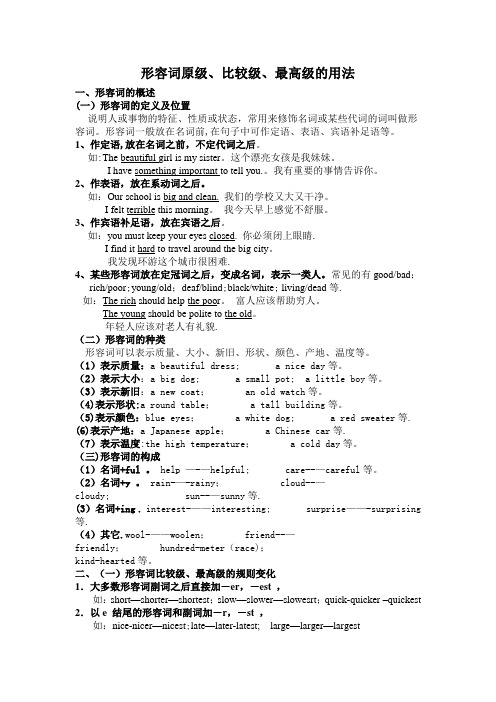
形容词原级、比较级、最高级的用法一、形容词的概述(一)形容词的定义及位置说明人或事物的特征、性质或状态,常用来修饰名词或某些代词的词叫做形容词。
形容词一般放在名词前,在句子中可作定语、表语、宾语补足语等。
1、作定语,放在名词之前,不定代词之后。
如:The beautiful girl is my sister。
这个漂亮女孩是我妹妹。
I have something important to tell you.。
我有重要的事情告诉你。
2、作表语,放在系动词之后。
如:Our school is big and clean. 我们的学校又大又干净。
I felt terrible this morning。
我今天早上感觉不舒服。
3、作宾语补足语,放在宾语之后。
如:you must keep your eyes closed. 你必须闭上眼睛.I find it hard to travel around the big city。
我发现环游这个城市很困难.4、某些形容词放在定冠词之后,变成名词,表示一类人。
常见的有good/bad;rich/poor;young/old;deaf/blind;black/white; living/dead等.如:The rich should help the poor。
富人应该帮助穷人。
The young should be polite to the old。
年轻人应该对老人有礼貌.(二)形容词的种类形容词可以表示质量、大小、新旧、形状、颜色、产地、温度等。
(1)表示质量:a beautiful dress; a nice day等。
(2)表示大小:a big dog; a small pot; a little boy等。
(3)表示新旧:a new coat; an old watch等。
(4)表示形状:a round table; a tall building等。
小学语法形容词和副词
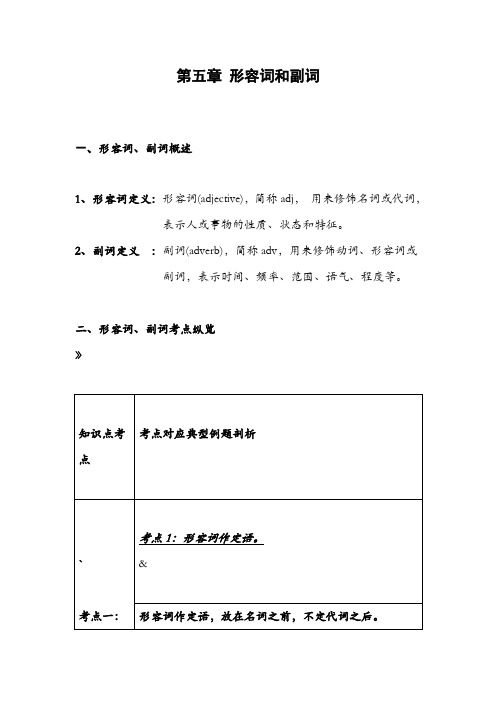
第五章形容词和副词一、形容词、副词概述1、形容词定义:形容词(adjective),简称adj,用来修饰名词或代词,表示人或事物的性质、状态和特征。
2、副词定义:副词(adverb),简称adv,用来修饰动词、形容词或副词,表示时间、频率、范围、语气、程度等。
二、形容词、副词考点纵览》)三、综合练习( ) 1. How beautifully she sings! I have never heard _____ voice.A. a betterB. a bestC. the betterD. the best ( ) 2. She looks very _____ but I can’t remember her name.A. similarB. familiarC. friendlyD. strange ( ) 3. Children all looked _____ at the broken model plane and felt quite _____.}A. sad; sadB. sadly; sadlyC. sad; sadlyD. sadly;sad( ) 4. The child dreamed that he had once lived in a _______ house in the forest.A. wooden pretty littleB. little pretty woodenC. pretty little woodenD. wooden little pretty( ) 5. ---Which team is _______ to win the game---I don’t know, but I’ve found _______ for ours to win.A. probable; it unlikelyB. likely; it possibleC. possible; it possibleD. likely; it possibly,( ) 6. With the development of the Internet, _______ communication is done by regular mail.A. lessB. moreC. littleD. few ( ) 7. ---If you don’t like the red coat, take the blue one.---OK, but do you have ______ size in blue This one’s a bit tight for me.A. a bigB. a biggerC. the bigD. the bigger ( ) 8. If there were no examinations, we should have ______ at school.A. the happiest timeB. a more happier timeC. much happiest timeD. a much happier time~( ) 9. This dress is prettier, but it costs ______ that one.A. twice more thanB. twice as much asC. as much twice asD. twice so much as( ) are required to take part in the boat race.A. Ten strong young ChineseB. Ten Chinese strong youngC. Chinese ten young strongD. Young strong ten Chinese ( ) 11. Allen had to call a taxi because the box was ____to carry all the way home.A. much too heavyB. too much heavy`C. heavy too muchD. too heavy much( ) 12. Our neighbor has ________ours.A. as a big house asB. as big a house asC. the same big house asD. a house the same big as ( ) 13. We were in ________when we left that we forgot the airline tickets.A. a rush so anxiousB. a such anxious rushC. so an anxious rushD. such an anxious rush( ) 14. ---I was riding along the street and all of a sudden, a car cut in and knocked me down./---You can never be ________careful in the street.A. muchB. veryC. soD. too( ) 15. ---You don’t look very ________.Are you ill---No,I’m just a bit tired.A. goodB. wellC. strongD. healthy ( ) 16. Four of Robert’s children were at the party,including ________, Luke.A. the eldestB. an oldest oneC. the oldD. an old one( ) 17. Many students signed up for the ________race in the sports meeting to be held next week.]A. 800-metre-longB. 800-metres-longC. 800 metre lengthD. 800 metres length( ) 18. It’s always difficult being in a foreign country,________if you don’t speak the language.A. extremelyB. naturallyC. basicallyD. especially( ) 19. In recent years,travel companies have succeeded in selling us the idea that the further we go,__________.A. our holiday will be betterB. our holiday will be the betterC. the better our holiday will beD. the better will our holiday be ( )20. When he heard a cry for help, he ran out as ________ as he could.A. hardlyB. quicklyC. finallyD. slowly )( ) 21. “Our team is _____ to win the match.” “Really But I don’t th ink so.”A. easyB. difficultC. possibleD. sure ( ) 22. A ______ road goes ______ from one place to another.A. straight; straightB. straightly; straightlyC. straight; straightlyD. straightly; straight( ) 23. “This book is ______ more useful for us students.” “Yes, but it is _______ too difficult.”A. quite; quiteB. much; ratherC. rather; quiteD. quite; much( ) 24. There was a ______ change in the weather, and the rain came pouring down.%A. quickB. slowC. fastD. sudden ( ) 25. You can speak ______ in front of him, but you can’t eat ______ in his restaurant.A. freely; freelyB. free; freelyC. freely; freeD. free; free( ) 26. Tom will n ot be at the picnic, ______ to the family’s disappointment.A. muchB. moreC. too muchD. much more( ) 27. --- I have seen so little of Mike ______. Is he away on business --- Oh, no. He just leaves for his office early and comes back very ______.A. later; latelyB. later; laterC. lately; lateD. late; lately( ) 28. From his ______ voice on the phone I know everything is well under way.A. satisfactoryB. satisfyingC. satisfiedD. satisfaction( ) 29. In ______ Chinese culture, marriage decisions were often made by parents for their children.A. traditionalB. historicC. peacefulD. civil ( ) 30. The houses in the village are ______ built of wood and hay.A. mostB. almostC. nearlyD. mostly( ) 31. --- What do people wear when they go to the theatre--- Well, it isn’t very ______. People can wear anything they like.A. normalB. certainC. modernD. simple ( ) 32. Mary’s biology is ______ than ______ in the class.A. a lot of better; anyone else’sB. far better; anyone’s else’sC. much better; anyone elseD. a lot better; anyone else’s ( ) 33. We decided not to climb the mountains because it was raining____.A. badlyB. hardlyC. stronglyD. heavily ( ) 34. Paris is one of _____ cities in the world.A. more beautifullyB. more beautifulC. the most beautifullyD. the most beautiful( ) 35. Are you going to leave______A. the open windowsB. the windows openingC. the windows openD. the windows opened( ) 36. Bob never does his homework _____ Mary, so he makes lots of mistakes.A. so careful asB. as carefully asC. carefully asD. as careful as.( ) 37. My sister is good at sports. She can jump ____ than me.A. highestB. very highC. too highD. much higher( ) 38. When spring comes, the trees get ____.A. green and greenB. green and greenerC. greener and greenD. greener and greener( ) works very _____________has a rest on Sundays.A. hard; hardlyB. hardly; hardC. hard; hardD. hardly; hardly( ) learns Russian_____________.A. goodB. niceC. wellD. fine( ) boy didn’t run______________ to catch the bus.A. fast enoughB. enough fastC. quick enoughD. enough quickly( ) _____________ is bad for our health.A. much tooB. too muchC. too moreD. too many( ) you ever seen ______________ big panda beforeA. a suchB. such aC. so aD. as ( ) looks very _____________ today.A. worriedB. worryC. worryingD. to worry( ) to me. I have _____________ to tell you.A. important somethingB. important anythingC. something importantD. anything important ( ) 46. ---How ___ can you finish the drawing--- In ten minutes.A. longB. often.C. soonD. rapid ( ) 47. This book is _____ worth seeing again.A. veryB. quiteC. wellD. much ( ) 48. My _____ brother is three years ____ than I .A. old; olderB. elder; olderC. older; elderD. old; elder( ) 49. We felt ___ after we watched the ___ football match.A. exciting; excitedB. excited; excitingC. excited; excitedD. exciting; exciting( ) 50. The old man lived ____ in the house, but he didn’t feel___.A. lonely; lonelyB. alone; lonelyC. alone; aloneD. lonely; alone参考答案1. A11. A21. D31. B41. A。
- 1、下载文档前请自行甄别文档内容的完整性,平台不提供额外的编辑、内容补充、找答案等附加服务。
- 2、"仅部分预览"的文档,不可在线预览部分如存在完整性等问题,可反馈申请退款(可完整预览的文档不适用该条件!)。
- 3、如文档侵犯您的权益,请联系客服反馈,我们会尽快为您处理(人工客服工作时间:9:00-18:30)。
形容词定义[adjective 简称adj.或a.] 很多语言中均有的主要词类中的一种。
主要用来修饰名词的词,表示事物的特征。
形容词用来修饰名词或代词, 表示人或事物的性质, 状态,和特征的程度好坏,与否。
[编辑本段]英语中形容词的用法形容词在句中作定语, 表语, 宾语补足语。
She is a good student, and she works hard.她是一个好学生,她学习努力。
This bike is expensive.这辆自行车很贵。
I am sorry, I'm busy now.对不起,我现在很忙。
Have you got everything ready for the meeting?你为这次会议做好准备吗?形容词在句中的位置:形容词作定语一般放在被修饰的名词之前。
如果有两个或两个以上的形容词修饰一个名词时, 则由它们和被修饰的名词之间的密切程度而定, 越密切的形容词越靠近名词。
如果几个形容词的密切程度差不多则按音节少的形容词放在前面, 音节多的形容词放在后面。
英语单词中,something, anything, nothing 等不定代词被形容词修饰时,形容词放在名词后面。
I have something important to tell you.我有重要的事要告诉你。
Is there anything interesting in the film?电影里有什么有趣的内容吗?There is nothing dangerous here.这儿一点都不危险。
由两个或两个以上的词组成的形容词词组修饰名词时须放在名词之后。
This is the book easy to read.这是一本容易读的书。
用and 或or 连接起来的两个形容词作定语时一般把它们放在被修饰的名词后面。
起进一步解释的作用。
Everybody, man and woman, old and young, should attend the meeting.每一个人,男女老少,都应该参加会议。
You can take any box away, big or small.这些箱子,不管大小,你都可以拿走。
形容词的比较级和最高级:绝大多数形容词有三种形式,原级,比较级和最高级, 以表示形容词说明的性质在程度上的不同。
形容词的比较级和最高级:形容词的比较级和最高级形式是在形容词的原级形式的基础上变化的。
分为规则变化和不规则变化。
规则变化:1) 单音节形容词的比较级和最高级形式是在词尾加-er 和-est 构成。
great (原级) greater(比较级) greatest(最高级)2) 以-e 结尾的单音节形容词的比较级和最高级是在词尾加-r 和-st 构成。
wide (原级) wider (比较级) widest (最高级)3)少数以-y, -er, -ow, -ble结尾的双音节形容词的比较级和最高级是在词尾加-er 和-est 构成。
clever(原级) cleverer(比较级) cleverest(最高级)4) 以-y 结尾,但-y 前是辅音字母的形容词的比较级和最高级是把-y 去掉,加上-ier 和-est 构成.happy (原形) happier (比较级) happiest (最高级)5) 以一个辅音字母结尾其前面的元音字母发短元音的形容词的比较级和最高级是双写该辅音字母然后再加-er和-est。
big (原级) bigger (比较级) biggest (最高级)6) 双音节和多音节形容词的比较级和最高级需用more 和most 加在形容词前面来构成。
beautiful (原级) difficult (原级)more beautiful (比较级) more difficult (比较级)most beautiful (最高级) most difficult (最高级)不规则变化原级比较级最高级good better bestmany more mostmuch more mostbad worse worstold elder/older eldest/oldestlittle littler/less(er) littlest/leastill worse worstfar farther/further farthest/furthest形容词前如加less 和least 则表示"较不"和"最不"important 重要less important 较不重要least important 最不重要tired 累的more tired 更累的most tired 最累的形容词比较级的用法:形容词的比较级用于两个人或事物的比较,其结构形式如下:主语+谓语(系动词)+ 形容词比较级+than+ 对比成分。
也就是, 含有形容词比较级的主句+than+从句。
注意从句常常省去意义上和主句相同的部分, 而只剩下对比的成分。
Our teacher is taller than we are.我们老师的个子比我们的高。
It is warmer today than it was yesterday.今天的天气比昨天暖和。
This picture is more beautiful than that one.这张照片比那张照片漂亮。
This meeting is less important than that one.这次会议不如那次会议重要。
The sun is much bigger than the moon.太阳比月亮大得多。
形容词最高级的用法:形容词最高级用于两个以上的人和物进行比较, 其结构形式为:主语+谓语(系动词)+the+形容词最高级+名词+表示范围的短语或从句。
She is the best student in her class.她是班上最好的学生。
Shanghai is one of the biggest cities in China.上海是中国最大城市之一。
This is the biggest apple I have ever met.这是我见到的最大的苹果。
Tom is the tallest boy in his basketball team.汤姆是他们篮球队中个子最高的孩子。
几个特殊用法:most 同形容词连用而不用the,表示"极,很,非常, 十分"。
It's most dangerous to be here.在这儿太危险。
I cannot do it, it's most difficult.我干不了这件事,太难了。
"The+形容词比较级..., the+形容词比较级..."表示" 越... 就越..."。
The more you study, the more you know.你学的越多, 就知道的越多。
The more I have, the more I want.我越有就越想要有。
The more, the better.越多越好。
" 形容词比较级+ and + 形容词比较级", 表示" 越来越... "。
It's getting hotter and hotter.天气越来越热了.It's pity he is getting poorer and poorer.真可怜他越来越穷了。
The computer is cheaper and cheaper.计算机越来越便宜。
The more and more people focus on the meeting next year.越来越多的人关注明年的会议。
主语+谓语(系动词)+as+形容词原形+as+从句。
表示两者对比相同。
This box is as big as mine.这个盒子和我的一样大。
This coat is as cheap as that one.这件衣服同那件衣服一样便宜。
I study English as hard as my brother.我同我兄弟一样学习努力。
用形容词表示类别和整体the + 形容词表示某种人。
He always helps the poor.他经常帮助穷人。
I like to have a talk with the young.我喜欢同年轻人谈话。
The rich sometimes complain their empty life.富人有时抱怨他们空虚的生活。
The police led the old man across the street.警察领老人横过马路。
以-ly结尾的形容词1)大部分形容词加-ly可构成副词。
但friendly,deadly,lovely,lonely,likely,lively,ugly,brotherly,仍为形容词。
改错:(错)She sang lovely.(错)He spoke to me very friendly.(对)Her singing was lovely.(对)He spoke to me in a very friendly way.2)有些以-ly 结尾的词既为形容词,也为副词。
daily,weekly,monthly,yearly,earlyThe Times is a daily paper.The Times is published daily.多个形容词修饰名词的顺序多个形容词修饰名词时,其顺序为:限定词--数词--描绘词--(大小,长短,形状,新旧,颜色) --出处--材料性质,类别--名词a small round tablea tall gray buildinga dirty old brown shirta famous German medical schoolan expensive Japanese sports car一般与被修饰形容词关系密切的形容词靠近名词;如果几个形容词的重要性差不多,音节少的形容词在前,音节多的方在后,在不能确定时,可参照下表:限定词+数量词(序数词在前,基数词在后)+性状形容词+大小、长短、高低等形体+ those + three + beautiful + large + square新旧+颜色+国籍+材料+名词old + brown + wood + table典型例题:1)Tony is going camping with ___ boys.A.little two otherB. two little otherC.two other littleD.little other two答案:C。
